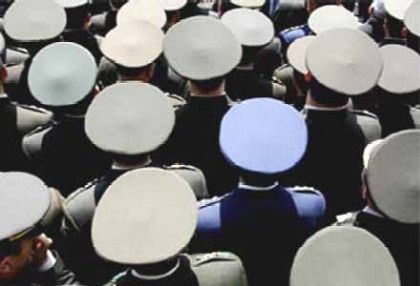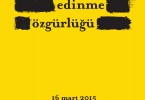News, Etc.
A spate of litigations against military personalities will most likely dominate the political agenda in Turkey after the parliament passed an amendment to the Penal Code enabling civilian courts to try army personnel for serious crimes.
One of the first steps was taken by a group of lawyers who petitioned the Van Penal Court demanding that former chief of staff, retired general Yasar Buyukanit to be brought to trial for his conduct during the bookshop bombing case in Semdinli in 2005.
Two non-commissioned officers and one former PKK (Kurdish Workers Party) member turned informer were caught by local people red-handed after a bomb exploded in a bookshop in southeastern town of Semdinli killing one person in 2005.
Buyukanit, then serving as Turkey’s chief of staff, said, “I know him, he is a good boy,” referring to one of the two non-commissioned officers arrested after the incident.
Ferhat Sarikaya, the prosecutor in Van who conducted the investigation, charged in the indictment that Buyukanit had set up an illegal paramilitary group in the region while serving there as the regional commander. According to Sarikaya, the illegal group was planning and carrying out provocations against the local people posing as PKK as well as involving in narcotics smuggling.
The charges cost Sarikaya his job and he was banned by the Supreme Board of Judges and Prosecutors, a civilian body overseeing the functioning of the judiciary, from practicing his profession.
Association of Contemporary Lawyers (CHD) demanded that Buyukanit to be tried on charges of “influencing” the jurisdiction by his behavior, a serious crime according to Turkish law.
The second demand came from Akin Birdal, a deputy of the Democratic Society Party (DTP), who had a narrow escape from an assassination attempt on May 12, 1998 while he was the President of Turkey’s Human Rights Association.
Birdal in his petition claims that retired general Cevik Bir pointed at him by name in a memorandum two weeks before the assassination attempt making him a target for nationalist militants.
The memorandum published by the Turkish media at that time included a list of people and associations allegedly siding with “enemies of Turkey.”
Birdal is asking the court to convict Cevik Bir on a number of counts including, “incitement to murder, slander, libel offense and setting up an armed gang.”
President Gul approves legislation, asks for rectification
Despite urging from both the Headquarters of the General Staff and the opposition leaders, President Abdullah Gul approved the Penal Code amendment which went into effect immediately. But in an accompanying note Gul asked the parliament to rectify some aspects of the legislation that might lead to equivocality.
The problem is, there is no quick remedy to what Gul described as equivocality in the amendment, since the legislative is in summer recess.
Prime Minister Tayyip Erdogan said he would discuss the President’s note with his “colleagues” and take the appropriate steps.
Government spokesman Cemil Cicek said the definition of “military offense” that should come under the jurisdiction of military courts should be clarified.
Secondly, he said, military personnel ranking from the chief of general staff to unit commanders “should be given legal guarantees in relation with their military duties.”
The amendment, as it stands today, does not include legal guarantees that the entire Turkish bureaucracy enjoys. That is, according to the Law on Legal Procedures for State Employees, bureaucrats can only be taken to court with the consent of their superiors. For example, no police officer can stand trial unless the local governor gives written consent.
The amendment to the Penal Code does not include such a stipulation for the military personnel. That is any citizen, group or prosecutor can initiate legal process against any officer whether he is retired or in active duty.
This aspect of the legislation is said to cause great unease within the ranks of the armed forces.
CHP applies to Constitutional Court
The main opposition Republican Peoples Party (CHP) applied to the Constitutional Court this week demanding the amendment to be repealed as unconstitutional. CHP argues that the amendment violates Article 145 of the Constitution which clearly says that only military courts are authorized to try offenses committed by the military personnel inside army premises.
Is it the army or Erdogan trying to put Turkey under tutelage?
CHP leader Deniz Baykal in a long speech to his party group accused Prime Minister Erdogan of trying to put the entire country under his own tutelage.
“For some time, with the initiation of Justice and Development Party (AKP) the country is debating tutelage of the army. Now I am asking, is there something that we don’t know? Is there something that is being hidden from the public? Is there a necessity for radical measures? Did the military change the election results? Which legislation did the soldiers prevented AKP from passing?” asked Baykal.
The opposition leader said that seven years ago Prime Minister Erdogan’s children studied abroad with scholarship money provided by a friend of his. “Now he is able to buy five villas at a time. The kid who studied on scholarship now appears as a ship owner. The newspapers that are printing these news are exposed to all kinds of suppression and the attempts to intimidate them are continuing with determination. Today, we see that there are ‘banned’ news in our media. The news that upset the prime minister cannot be printed any longer,” said Baykal.
“Nobody says that those who plan coups should not stand trial. There should be no tutelage of the military in Turkey. I would undersign this. But today, what is in question in Turkey is not the tutelage of the military but the tutelage of Erdogan,” Baykal said.







